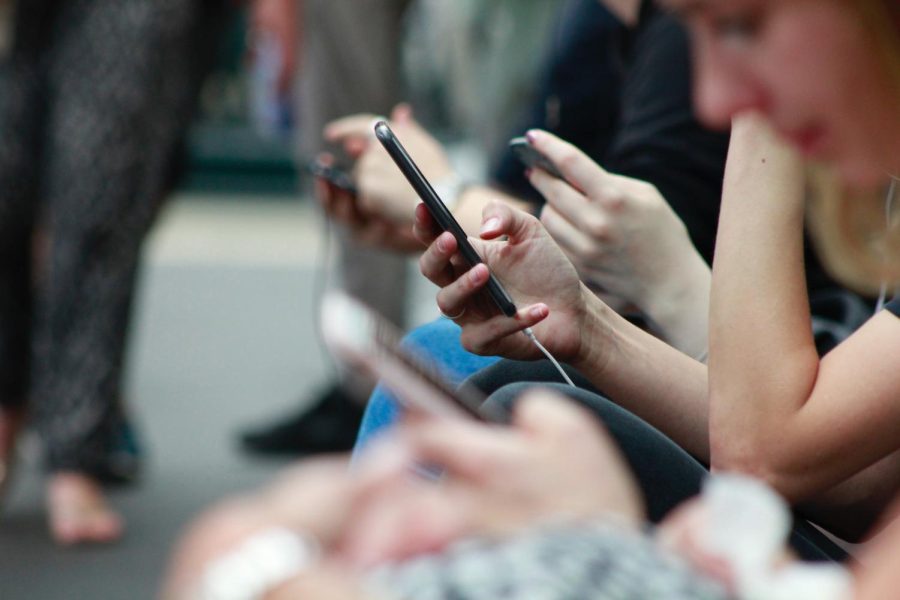Social media, scrolling and mental health
People surrounded by each other yet scrolling on their phones.
February 23, 2023
It’s a situation that almost all of us seem to find ourselves in; we sit down, begin scrolling through content on our phones or computers, and before we know it, an entire hour has passed. This “infinite scroll” can take up our valuable time and impact our productivity and attentiveness, among other traits.
The quick nature of scrolling through endless content triggers the brain’s dopamine reward system, creating a sort of neurological “high”. This behavior becomes addictive and habit forming and can lead or contribute to obsessive-compulsive behaviors, depression and anxiety.
Apps and websites such as Instagram, TikTok, Twitter, Reddit and YouTube Shorts are specifically designed to make the user crave more fast content. The ease of scrolling through content on these apps is extremely stimulating to our brains. When dopamine is produced in this way, it increases difficulty for our brains to produce dopamine through healthier and more “natural” methods.
I fall prey to this exact phenomenon on a regular basis. On many occasions I’ve continuously disrupted my sleep cycle, missed out on doing something that I wanted or needed to do and completely lost all sense of focus on tasks that should’ve taken priority.
Like many people in our age group, UNCA sophomore Ryan Cromer struggles with being sucked into the streams of content.
“I definitely get carried away with looking at social media on a daily basis,” Cromer said. “A random post tends to catch my attention, I get thrown down a rabbit hole of content and I lack the desire to stop. It’s enjoyable in the moment, but it distracts me too much and severely lowers my productivity.”
UNCA sophomore Luke Lawida shares similar experiences.
“I’m often scrolling for hours, especially late at night,” Lawida said. “I feel like I lose all sense of time and have no control over when and how the scrolling ends.”
Both Cromer and Lawida reported Instagram as the app they spent the most time scrolling on. With 1.3 billion users in the month of January, Instagram is a juggernaut in the world of scrolling. The algorithms apps like Instagram use are designed to show the user personalized content that will make them want to continue scrolling.
When asked which social media app UNCA students use the most on the Blue Banner Instagram story, 60% of respondents reported Instagram was their app of choice, with Twitter, Reddit and TikTok receiving the remaining 40% of votes cast. These results could be skewed by the poll taking place on Instagram itself but the result is still overwhelming.
“Social media can be fun and entertaining in moderation but without conscious effort people can get carried away,” Cromer said. “Countless hours spent on multiple different apps is definitely showing some long-term effects.”
Many don’t realize it, but the habits these apps form are being ingrained into our minds and behavior.
“The way new forms of media work, condition and shape our behavior without us even being aware of it, regardless of the content we are watching,” said UNCA Associate Professor of psychology Michael Neelon.
When perusing content, a dangerous feedback loop of negative information can often take place. This phenomenon, coined as “doomscrolling”, is linked to a decline in physical and mental health in the user. The aforementioned algorithms on these apps can continuously feed the user additional content in this manner.
Lawida said he is concerned about how scrolling behavior could continuously affect him moving forward and has plans to be more proactive in preventing infinite scrolling.
“There is definitely a negative impact on my health, it can cause me to lose lots of sleep and feel drained in the morning. I’m sure that this will be a chronic thing that will unfold over time so I’m really trying to be cognizant of it,” Lawida said.
With the amount of access to quick content, many are worried about impacts it will ultimately have on young, developing minds, especially ones that start from a young age.
“I think it’s 100% a prominent issue for youth overall, especially the younger kids. I can’t imagine how much of a toll it’s taking on minds in the early stage of development,” said Lawida.
As we move forward, this is certainly an issue to keep in mind.


















